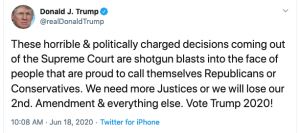
During the Trump years, critics have often felt a professional obligation to criticize the administration’s use of rhetoric to foster cruelty and perpetuate a fantasy of violence. The fantasy is rooted in what literary critic Richard Slotkin called (50 years ago) the “American mythogenesis.” And it tells the story of American identity and strength as dependent on “regeneration through violence.” Today, Trump extends the fantasy through language, partly by coding administrative action as valiant, partly by soliciting sympathetic readers to ascend from the rank-and-file to heroism in the life-threatening context of American life.
On the one hand, it’s just words.
On the other, it’s not.
Trump recently contributed a tweet to the perpetuation of this fantasy in response to the Supreme Court’s 5-4 DACA ruling. The majority decision, penned by Bush appointee, John Roberts, called the federal administration’s decision to terminate DACA “arbitrary and capricious,” noting it failed to provide adequate information that “policy concerns outweigh[ed] reliance interests.” Dreamers were consequently granted temporary reprieve.
Trump’s response:

The aggressive language casts the decision as murderous, and its violent imagery facilitates the Manichean worldview on which fascism depends. It’s us against them, Trump warns, by any means necessary. Here, fascism’s nationalists are redefined as warriors. Because they face political opposition, which in Trump’s language endangers their lives, they are not only freed from the rules governing shared reality, they are freed from sharing in the common sense of reality at all.
The fantasy of violence works by way of a superficial imitation of the flight-or-fight binary. When matters of political disagreement are defined as a threat to life, any retaliatory action is justified, no matter how distorted the perception of threat.
It’s possible that a fantasy rooted in violent American myth is the most effective way to communicate federal policy informed by white supremacy. But we must recognize its use as a weapon that damages our shared reality. It’s not “just words” when it perpetuates a warrior worldview: It’s actionable, fostering systemic division and the violence attendant to it.
How can such a “war” be won? It’s not entirely clear. But most of us already know that weapons of violence and “shotgun blasts into the face” do not solve complicated problems.
